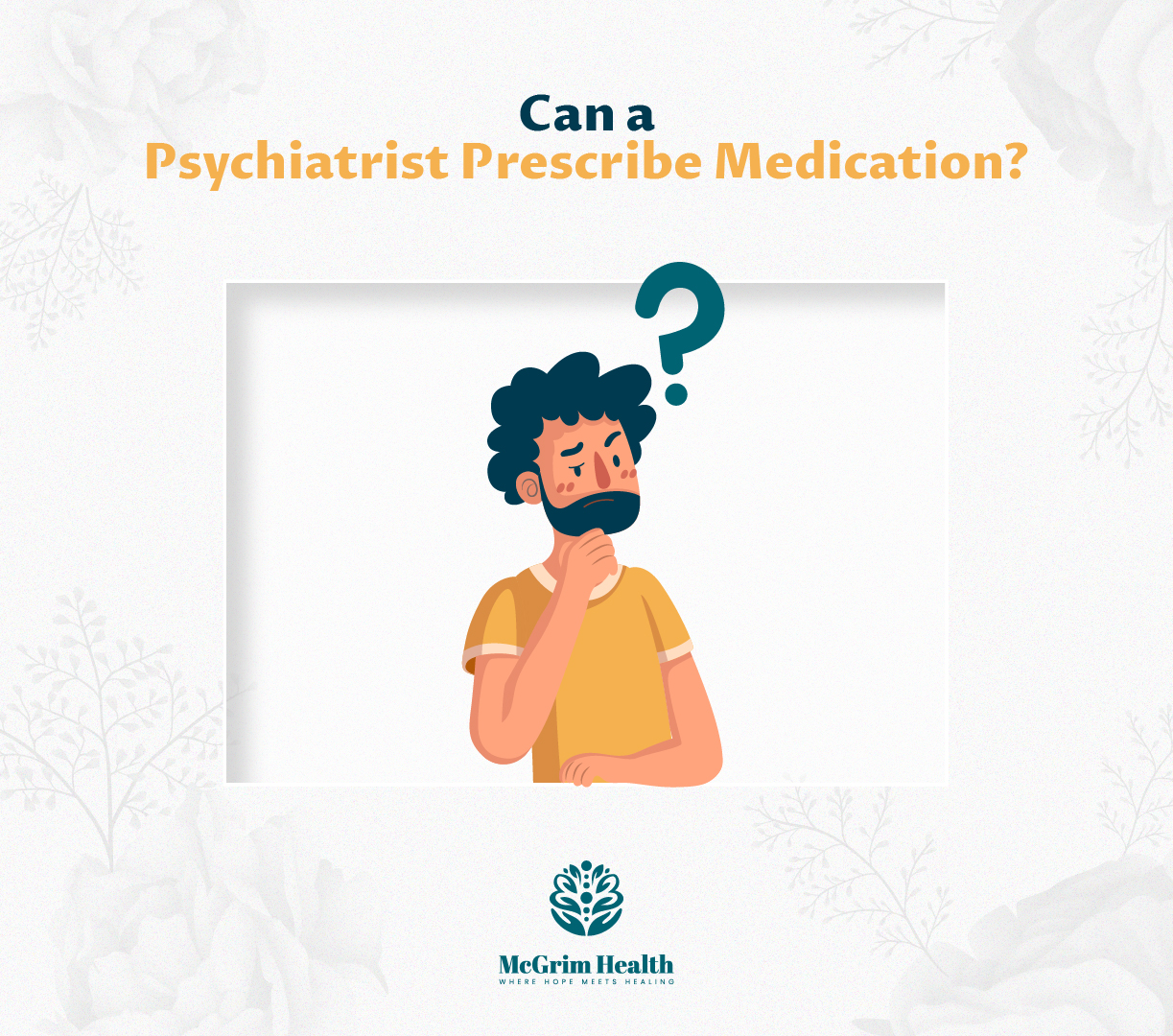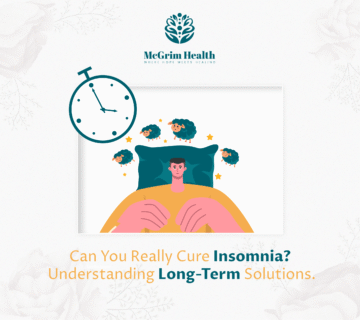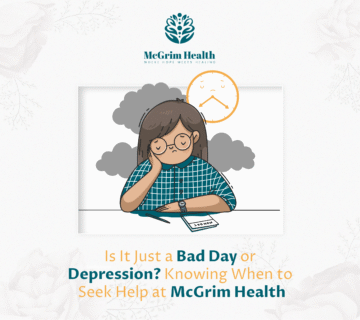When it comes to mental health treatment, understanding the roles and capabilities of different healthcare providers is essential. One common question people have is: can a psychiatrist prescribe medication?
The answer is yes. In this blog, we’ll explain how psychiatrists can prescribe medicine. We’ll also talk about what their job in mental health care is and what your first visit to a psychiatrist might be like.
What is a Psychiatrist?
A psychiatrist is a medical professional specializing in identifying, treating, and stopping mental, emotional, and behavioral problems. They’ve completed medical school and received extra training in psychiatry.
This lets them grasp the intricate link between physical and mental wellbeing. Thanks to their medical education, psychiatrists have unique abilities to prescribe medicines and manage treatment plans which may combine medication and therapy.
Can a Psychiatrist Prescribe Medication?
Can a psychiatrist prescribe drugs? Indeed, psychiatrists can give out prescriptions. They use medications to tackle mental conditions such as depression and anxiety, or even bipolar disorder and schizophrenia.
They commonly prescribe medications such as:
Antidepressants
These are for handling depression and anxiety disorders. They balance brain chemicals which control mood and feelings.
Common kinds are:
- Selective Serotonin Reuptake Inhibitors (SSRIs)
- Serotonin and Norepinephrine Reuptake Inhibitors (SNRIs)
- Tricyclic Antidepressants (TCAs)
- Monoamine Oxidase Inhibitors (MAOIs)
Antipsychotics
Antipsychotics assist in handling conditions such as schizophrenia and Bipolar disorder. They are beneficial in managing signs like seeing things, having strong beliefs, and extreme mood changes.
- Typical Antipsychotics: Older medications like Haloperidol.
- Atypical Antipsychotics: Newer medications like Risperidone and Olanzapine.
Mood Stabilizers
Mood stabilizers control mood shifts in illnesses like bipolar disorder. They prevent both manic and depressive episodes. Common mood stabilizers include:
- Lithium
- Valproate
- Lamotrigine
Anxiolytics
Anxiety-reducing drugs, or anxiolytics, help combat anxiety issues. Such medicines encompass benzodiazepines and non-bezodiazepines medicatons like:
- Alprazolam
- Diazepam
- Buspirone
Stimulants
Stimulants, which are regularly employed to curb Attention Deficit Hyperactivity Disorder (ADHD). These cognitive enhancers boost one’s concentration and diminish impulsive behavior. Examples include:
- Methylphenidate
- Amphetamine salts
Can a Psychiatrist Prescribe Medication on First Visit?
Many wonder if a psychiatrist can provide medication on the first appointment. The response leans on various elements, like the individual’s health record, symptom severity, and the psychiatrist’s judgment.
Initial Evaluation
In the initial visit, there’s a complete evaluation to know the patient’s situation. This review commonly includes:
- Medical History: Reviewing past medical and psychiatric aspects.
- Symptom Analysis: Grasping the existing symptoms and their effect on day-to-day existence.
- Physical Exam: Performing a physical exam, if required.
- Diagnostic Tests: Requesting essential lab checks or psychological evaluations.
Decision to Prescribe
The psychiatrist’s first assessment is critical. They might advise medicine right away, particularly if the condition is grave and needs direct action. In certain instances, though, more scrutiny or tests may be needed before settling on a plan.
Can Mental Health Practitioners Prescribe Medication?
“Mental health practitioners” is a term that covers many professionals like psychologists, therapists, and social workers but not all of them can write prescriptions for medicines though.
Who can prescribe mainly depends on their training and licensing.
Psychologists
Psychologists, for instance, have advanced degrees in psychology (Ph.D. or Psy.D.). They are trained to do therapy and psychological tests. Usually, they aren’t allowed to prescribe medicines in many states. However, some states do give limited prescribing rights to psychologists with special training.
Therapists and Counselors
On the other hand, we have therapists and counselors. They mostly have a master’s degree in their respective fields and the necessary license to do therapy. Although they can’t give out medicine, they can team up with psychiatrists or other doctors to ensure top-notch care.
Psychiatric Nurse Practitioners
Can a psychiatric nurse practitioner prescribe medication? Psychiatric Nurse Practitioners (PNPs) are advanced practice registered nurses. They’re experts in the field of mental health. They’re trained and authorized to prescribe medicines. They usually work with a psychiatrist watching over them, or by themselves, this can vary based on different state rules.
The Role of Medication in Mental Health Treatment
Drugs are key in handling mental health problems, but they work best when paired with additional treatments like counseling and life adjustments. Here’s a peek into the pros and cons:
Benefits of Medication
- Symptom Relief: Drugs can rapidly lessen intense symptoms, aiding patients in achieving balance.
- Improved Functioning: Symptoms managed by medication can boost the overall daily life and well-being.
- Preventing Relapse: Persistent use of specific drugs can prevent relapse and sustain mental health balance.
Considerations
- Side Effects: All drugs may have possible side reactions, a topic worth addressing with the prescribing psychiatrist.
- Adherence: Taking drugs as directed is crucial. Don’t stop abruptly without talking to a doctor.
- Monitoring: Frequent appointments are vital to evaluate the drug’s effectiveness and make needed changes.
Takeaway
So, can a psychiatrist prescribe medication? Absolutely. Psychiatrists are medically trained doctors specializing in mental health. This prepares them excellently to spot conditions and prescribe the right medications.
Thus, if it’s your first time visiting a psychiatrist or you’re seeking help for an ongoing problem, you can make better decisions about your mental health care by comprehending their role and the benefits of medication.
Don’t forget, medicines can be extremely effective in handling mental health conditions but usually work their best when used with therapy and other support methods. Always discuss with your healthcare giver the most beneficial care plan tailored for your needs.
For more information on medication management , reach out directly to us at McGrim Health today.
FAQs
Can Psychiatrists See Past Prescriptions?
Yes, they do. In fact, past medications are part of your medical history that psychiatrists consider during visits. With access to your electronic health records (EHRs), they can gauge your prescription history and make informed treatment decisions. This helps to avoid any harmful interaction with new prescriptions.
Can a Psychiatrist Prescribe Pain Medicine?
Although they mainly prescribe mental health meds, they can prescribe pain medicine too if it’s connected to a psychiatric condition. Say, chronic pain ties up with a mental health issue like depression or anxiety, a psychiatrist may include pain meds in your treatment. They may recommend a pain expert for specialized care.
Which Psychiatrists Can Prescribe Medication?
All psychiatrists can prescribe medication. They’re certified medical doctors with a specialization in psychiatry, which gives them the authority to prescribe medicines across sub-specialties like children’s mental health, geriatric psychiatry, etc. They’re trained to diagnose and manage treatment plans that may involve meds.
Do Psychotherapists Prescribe Medication?
The answer is no. Psychotherapists like psychologists, social workers, and counselors provide therapy and counseling, rather than medicine. They tend to focus on therapy techniques for managing mental health. They cannot prescribe medicines, but can collaborate with medical doctors who do.
Can a Therapist Prescribe Antidepressants?
No, therapists like counselors and psychologists don’t have the authority to prescribe antidepressants. This requires licensing and medical training, which they do not have. Even so, therapists can play a key role in identifying the need for such medication and may direct patients to a psychiatrist or a general physician for prescription if needed.





No comment